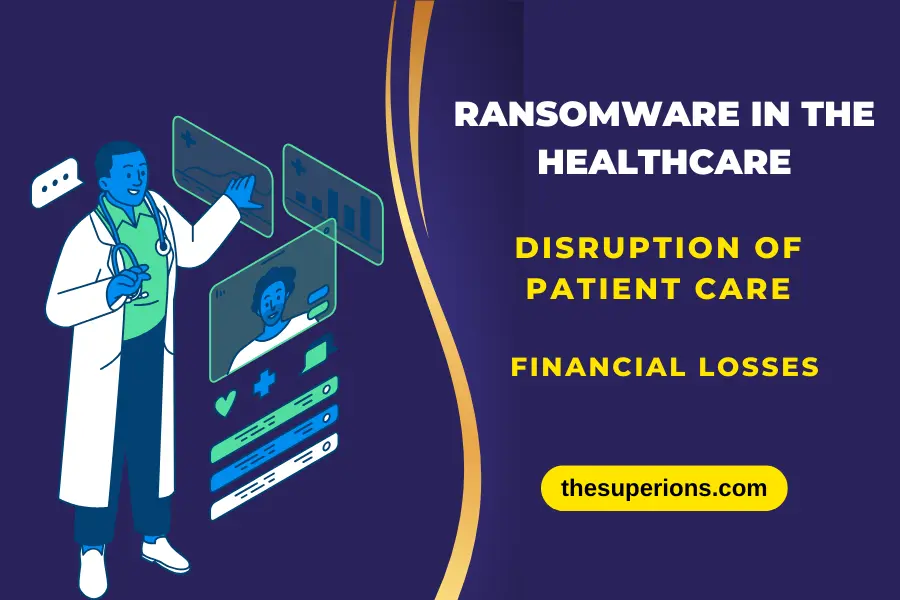Impact of Ransomware in the Healthcare Industry
Ransomware has emerged as one of the most insidious and pervasive threats facing the healthcare industry today. With its ability to encrypt critical data and hold it hostage until a ransom is paid, ransomware can potentially disrupt patient care, compromise sensitive medical information, and inflict financial harm on healthcare organizations. The healthcare industry is particularly vulnerable to ransomware attacks due to its reliance on digital systems to store and manage patient records and the increasing interconnectedness of medical devices and networks.

The impact of ransomware in the healthcare industry extends far beyond the immediate financial costs of paying a ransom. A ransomware attack can disrupt healthcare services, causing delays in patient care and potentially putting lives at risk. Hospitals and clinics have sometimes been forced to divert patients to other facilities or cancel appointments and surgeries due to ransomware attacks. This can impact patient health outcomes and erode trust in the healthcare system. IT Consulting Nashville experts help healthcare to prevent vulnerable ransomware attacks.
In this article, we will explore what is healthcare ransomware and impact of ransomware attacks in healthcare.
People Also Read?
What is Ransomware in Healthcare?
Ransomware in healthcare refers to malicious software that is designed to block access to a healthcare organization’s computer system or data until a ransom is paid. This cyberattack can have severe consequences for healthcare providers, as it can disrupt their operations, compromise patient data security, and potentially impact patient care.
Ransomware attacks in healthcare have increased recently, prompting organizations to enhance their cybersecurity measures to protect against such threats. Preventative measures such as regular data backups, employee training on cybersecurity best practices, and robust security protocols are crucial in safeguarding healthcare systems from ransomware attacks. In a ransomware attack, swift response and containment efforts are essential to minimize the damage and prevent further spread within the organization’s network.
Impact of Ransomware in Healthcare Industry
1. Disruption of Patient Care
Ransomware attacks have significantly impacted the healthcare industry, particularly in terms of disrupting patient care. These malicious attacks can result in the encryption of critical patient data, making it inaccessible to healthcare providers. Consequently, hospitals and medical facilities may need help delivering timely and effective patient care.
The disruption caused by ransomware can lead to delays in treatments, surgeries, and appointments, potentially risking patients’ health and well-being. Furthermore, the financial implications of such attacks can be substantial, with organizations facing hefty ransom demands and costs associated with restoring systems and data. Healthcare institutions must invest in robust cybersecurity measures to mitigate the risks posed by ransomware threats and safeguard patient care.
2. Data Breach and Privacy Concerns
Ransomware attacks have profoundly impacted the healthcare industry, particularly concerning data breaches and privacy concerns. These malicious cyber incidents disrupt healthcare operations and compromise sensitive patient information. As healthcare organizations handle vast amounts of personal and medical data, the repercussions of such breaches can be severe, leading to potential regulatory fines, legal implications, and reputational damage.
Safeguarding patient privacy and securing medical records against ransomware threats is paramount to maintaining trust in the healthcare system and ensuring the continuity of quality care delivery. Instituting robust cybersecurity measures, regular staff training, and implementing incident response protocols are critical steps in mitigating the risks posed by ransomware attacks in the healthcare sector.
3. Financial Losses
Ransomware attacks have had a significant financial impact on the healthcare industry. These cyberattacks can lead to substantial economic losses for healthcare organizations due to several factors, including the costs associated with investigating and remediating the attack, potential loss of revenue from disrupted services, and expenses related to implementing enhanced cybersecurity measures to prevent future incidents.
Furthermore, the reputational damage resulting from a ransomware attack may lead to a loss of patient trust and ultimately impact the organization’s bottom line. As the healthcare industry continues to be a target for ransomware attacks, organizations must prioritize cybersecurity measures to mitigate financial risks and safeguard sensitive patient data.
4. Reputational Damage
The impact of ransomware in the healthcare industry extends beyond financial losses to include reputational damage. When patient data is compromised due to a ransomware attack, healthcare organizations face the risk of hefty fines for failing to protect sensitive information and damage to their reputation and trust with patients.
The loss of confidence in the organization’s ability to safeguard personal data can have long-lasting repercussions, affecting patient loyalty and potentially leading to a decline in business. Therefore, healthcare entities must invest in robust cybersecurity measures to mitigate the risks associated with ransomware attacks and uphold their reputation as trusted custodians of patient information.
5. Regulatory Compliance Issues
Ransomware attacks in the healthcare industry pose serious security threats and raise significant regulatory compliance issues. Healthcare organizations are required to adhere to strict data protection regulations, such as the Health Insurance Portability and Accountability Act (HIPAA) in the United States, which mandates safeguarding patient data and reporting breaches promptly.
When a ransomware attack occurs, healthcare providers must balance between paying the ransom to regain access to critical patient information or risking potential regulatory fines for non-compliance with data protection laws. The impact of ransomware on regulatory compliance can be far-reaching, underscoring the importance of robust cybersecurity measures and incident response protocols within the healthcare sector.
6. Operational Challenges
Ransomware attacks have significantly impacted the healthcare industry, leading to various operational challenges. These attacks can disrupt critical systems and services, causing delays in patient care and potentially compromising sensitive patient data. Healthcare providers are often forced to divert resources toward addressing the ransomware attack, which can lead to financial strain and decreased productivity.
Additionally, the reputational damage resulting from a successful ransomware attack may erode patient trust in the organization. As such, healthcare institutions must implement robust cybersecurity measures to mitigate the risks of ransomware and safeguard their operations and patient information.
People Also Read?
Conclusion
The impact of ransomware in the healthcare industry is extensive and significant, affecting not only individual healthcare organizations but also patient care and safety. The increasing frequency and complexity of ransomware attacks emphasize the urgent necessity for robust cybersecurity measures, such as regular backups, employee training, and advanced threat detection systems. Healthcare providers must prioritize cybersecurity to safeguard sensitive patient data, ensure uninterrupted care delivery, and uphold trust in the healthcare system. Collaboration among healthcare organizations, cybersecurity experts, and government agencies is crucial to combat the evolving threat landscape and protect the integrity of healthcare services for all. So, if you’re looking for security solutions for your healthcare sector, visit IT Support Louisville experts to get started.





